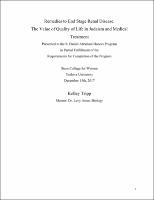Please use this identifier to cite or link to this item:
https://hdl.handle.net/20.500.12202/34Full metadata record
| DC Field | Value | Language |
|---|---|---|
| dc.contributor.author | Tripp, Kelley | |
| dc.date.accessioned | 2018-04-18T14:20:20Z | |
| dc.date.accessioned | 2018-05-01T17:53:42Z | |
| dc.date.available | 2018-04-18T14:20:20Z | |
| dc.date.available | 2018-05-01T17:53:42Z | |
| dc.date.issued | 2017-12-15 | |
| dc.identifier.uri | https://hdl.handle.net/20.500.12202/34 | |
| dc.identifier.uri | https://ezproxy.yu.edu/login?url=https://repository.yu.edu/handle/20.500.12202/34 | |
| dc.description | The file is restricted for YU community access only. | |
| dc.description.abstract | Background and Introduction: Quality of life is highly considered by medical professionals, developers, and researchers as well as by Jewish law. However, both define quality of life differently. Judaism defines quality of life as living something meaningful, while secular medicine defines quality of life as the patient’s subjective “good or bad.” Through the lens of Kidney Disease, this paper explores the extent to which medical advancement considers and values quality of life through the lens of end stage renal disease. Kidney disease requires a new kidney or the use of an external machine to filter the blood that requires one to constantly be connected to it or maintaining it, thereby affecting quality of life. Data: Both traditional, such as dialysis and transplant, and new methods of treatment, such as artificial kidneys or wearable dialysis devices, for kidney disease are delineated and explored. Methods: This paper conducted a literature review of all remedies of kidney disease. It also explored sources about quality of life in both Jewish texts and texts of secular medical ethics. Results: The paper explores the risks and benefits of each remedy when considering each of their effect on quality of life. Most remedies enhance quality of life, while some in fact degrade it, usually by taking a lot of the patient’s time for dealing with filtering devices. Discussion: This paper will discuss the differences in Judaism and medicine’s value of quality of life and call for medicine to deeply consider patients’ quality of life when developing medical advancements. | en_US |
| dc.description.sponsorship | S. Daniel Abraham Honors Program | en_US |
| dc.language.iso | en_US | en_US |
| dc.publisher | Stern College for Women | en_US |
| dc.rights | Attribution-NonCommercial-NoDerivs 3.0 United States | * |
| dc.rights.uri | http://creativecommons.org/licenses/by-nc-nd/3.0/us/ | * |
| dc.title | Remedies to End Stage Renal Disease: The Value of Quality of Life in Judaism and Medical Treatment | en_US |
| dc.type | Thesis | en_US |
| Appears in Collections: | S. Daniel Abraham Honors Student Theses | |
Files in This Item:
| File | Description | Size | Format | |
|---|---|---|---|---|
| Kelley Tripp.pdf Restricted Access | 302.86 kB | Adobe PDF |  View/Open |
This item is licensed under a Creative Commons License

